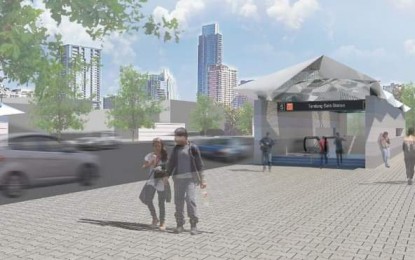
An artist's rendering of an entrance to one of the Subway stations. (Courtesy of DOTr)
MANILA – The Department of Transportation (DOTr) on Monday signed a contract to order 240 train cars for the Metro Manila Subway Project (MMSP) from a Japanese joint venture contractor.
In a virtual ceremony, Contract Package (CP) 107 of the MMSP was signed by DOTr Secretary Arthur Tugade and Sumitomo Corporation (Sumitomo) General Manager for Social Infrastructure Business Division Hidemasa Kozawa—representative of Japan Transport Engineering Company (JTREC) and Sumitomo joint venture (JTRAC-Sumitomo).
The contract, with a total approved cost of almost PHP367 billion and financed by the Japan International Cooperation Agency (JICA), includes the design, supply, installation, construction, testing, and commissioning of 240 train cars—or 30 eight-car train sets—for the subway project.
During the ceremony, DOTr Undersecretary Timothy John Batan said a single train of the MMSP would have a maximum capacity of 2,242 passengers—potentially removing up to 1,300 cars, 220 jeepneys, or 60 buses from Metro Manila roads.
“We will have 30 train sets for the subway alone. Indeed, the sustainable solution for our traffic congestion is the buildup of our mass transportation network,” Batan said.
He noted that the order is larger than the 224 operational train cars the country had back in 2016.
“Itong isang order po na ito ay mas madami pa sa total na bilang ng mga bagon na nadatnan ng DOTr na tumatakbo sa ilalim ng pamumuno ni Secretary Tugade noong 2016 (This order alone is bigger than the total number of operational train cars the DOTr, under the leadership of Secretary Tugade, was left with in 2016),” Batan said.
To date, he said the country is on track to increase its train fleet to 1,381 train cars—either ordered, undergoing production, delivered, or operational in 2020.
The first phase of the MMSP is a 34-kilometer-long underground railway system running from Valuenzela City to Parañaque City, ending with a connection to the Ninoy Aquino International Airport Terminal 3.
The partial operability section of the MMSP’s first phase—which includes the construction of the depot and four stations from East Valenzuela to North Avenue—began construction in 2019 and will be operational by 2022.
The remaining operability section—which includes 13 stations from Quezon Avenue Station to Bicutan Station and NAIA Terminal 3 Station—will begin construction in 2021 and is expected to be operational by 2026. (PNA)
